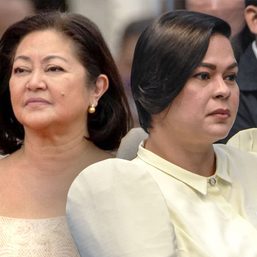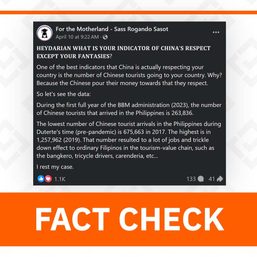SUMMARY
This is AI generated summarization, which may have errors. For context, always refer to the full article.
![[Newsstand] Duterte’s choices for president](https://www.rappler.com/tachyon/2022/01/Duterte-choices-pres.jpg)
President Rodrigo Duterte ended 2021 a smaller figure than when he started it. I hasten to make clear: He remains the most influential member of the political class; his grip on the most powerful position in the government remains secure; his personal popularity remains high. But he came out of 2021 having dramatically failed to secure his overriding objective: choose the terms of his transition from office. In language the basketball-crazy country he has misruled for five and a half years might use, he was completely boxed out, again and again, in the year’s most important plays.
It wasn’t the so-called lame duck syndrome that diminished the President, although his failure can only accentuate the negative in his last six months in office – it was the spectacular collapse of ALL his succession plans. Strip the President’s substitution strategy of all the drama and the noise, and his situation is clear. He did not get what he wanted.
He did not get his headstrong daughter, Davao City Mayor Sara Duterte, to run for president. He and his allies tried many tacks, some the political equivalent of cheap talk (such as his short-lived candidacy for vice president, to prevent the junior Duterte from sliding down to the secondary position) and some very costly signals indeed (such as a nationwide publicity drive and an orchestrated campaign among local governments).
He did not get his loyal aide, Senator Bong Go, to mount a credible alternative presidential campaign. I think President Duterte misread Go’s strong showing in the 2019 Senate elections (a showing the President made possible, with his instructions to local government officials that Go should place third behind Cynthia Villar and Grace Poe) as a sign that his aide could be a viable presidential candidate; very quickly, Go realized the limits of his own support.
He did not get the popular boxer, Senator Manny Pacquiao, to give up his own presidential ambition – a dangerous complication for the junior Duterte, because of their shared Mindanao base. An attempt was made to restart their friendship, but by then President Duterte had said too many harsh words about Pacquiao.
Succession plan
The result: For the first time, an incumbent president and his political party have no candidate for president. The lack of a succession plan at the start of the election cycle becomes even more glaring in the light of repeated attempts over the years to ensure continuity for the Duterte brand of leadership: a Congress-led campaign to change the Constitution (failed); the President’s own overtures to military leadership to form a junta (politely ignored); bureaucratic efforts to revoke a “revolutionary government” moment (stillbirth).
Why doesn’t the President simply make peace with his daughter’s decision to run as Ferdinand Marcos Jr.’s vice presidential candidate, embrace Marcos Junior and his candidacy, and be done with it? His support is the only major piece missing from the Marcos election strategy.
His initial response to the pairing he tried to prevents shows that, whatever debt of gratitude he might feel toward the Marcos family for their early support of his presidential candidacy, he already considers it fully paid. President Duterte called Marcos “pro-communist,” a “weak leader,” a “spoiled child,” and without mentioning him by name but obviously referring to him, spoke of a presidential candidate with a cocaine habit.
If we know anything by now about the President and his use of the presidential bully pulpit, he really does say the quiet part out loud. Whether he or (more likely) a spokesperson walks back these statements, we should consider them as candid, real expressions of his opinion.
He also questioned the political wisdom of uniting behind a presidential candidate with lower ratings than his own daughter. We will hear less about this now, after the December 2021 Pulse Asia survey showed Marcos Junior with a commanding lead. But if that lead shrinks dramatically in the next few months, we might hear the question raised again.
Hard leverage
But over and above these reasons, I think his entire experience in politics is telling him he loses all hard leverage he has over the junior Marcos the moment Ferdinand Marcos Jr. becomes president. This is true, of course, regardless of who the next president will be; President Duterte, who has made maximal use of the powers of the presidency, will suffer severe withdrawal symptoms after June 30. The real issue then must be that his political instincts tell him he cannot trust Marcos Junior, either as a politician or as a negotiating partner.
In his retirement, he would want at least two guarantees: That the Philippine government will not arrest him to stand trial at the International Criminal Court, and that his signature legacy, his so-called war on drugs, continue. He may wonder whether Marcos Junior would have the fortitude to withstand international pressure in case of an adverse ICC order, and the character to lead the anti-drugs campaign.
The notion that President Duterte, in his retirement, can engineer an impeachment of the junior Marcos as president if the junior Duterte is vice president is a political fantasy. In the first place, the inevitable realignment in the House of Representatives that happens after the new president is elected will continue to follow sorry tradition; many legislators will either change parties or join political coalitions to ally with the new president, not with the new vice president. In the second place, the gravity of power in the 19th Congress will likely revolve around Gloria Macapagal Arroyo, the former president and former speaker, and her close allies, including potential speaker Martin Romualdez. These are the very people who put the tandem of the Juniors together.
Limited choices
The President’s choices, then, are actually limited to two options.
1. He can accept his daughter’s choice and formally align with Marcos Junior. This simplifies matters for the different factions that make up the Duterte coalition, helps heal some of the rifts created by factional conflict, generates the best possible conditions for victory – but at the cost of his own post-presidential influence. The December survey shows Marcos Junior can win even without the President’s support. Once Marcos Junior becomes president, President Duterte becomes at best the third most influential player in that winning coalition, after Marcos and Arroyo. He will merely be the retired leader of another faction; in contrast, if his daughter or his aide were president, he would be the undisputed elder of the main group.
2. He can support another candidate, and then engineer complications for Marcos Junior’s candidacy – whether by exerting illegal pressure on his appointees in the Commission on Elections to cancel Marcos’ certificate of candidacy or to disqualify him, or by attacking Marcos Junior directly. That other candidate can only be Manila Mayor Isko Moreno; interestingly, in the last several weeks Moreno has been deliberately and methodically courting the President, asking for his endorsement.
Why would President Duterte back another candidate with much lower ratings than Marcos Junior or even opposition leader Vice President Leni Robredo? As his quarter-century as Davao city mayor proves, he is used to stoking internal competition to get results. Controlled factionalism appeals to his deepest Darwinian instincts. In this view, backing Moreno, at least for the next couple of months, to see if his ratings improve, allows President Duterte to negotiate for stronger concessions with both Moreno and Marcos Junior. Not the strongest of hands, but the chief executive still has the capacity to create executive mischief. – Rappler.com
Veteran journalist John Nery is a columnist and editorial consultant of Rappler.
Add a comment
How does this make you feel?
![[WATCH] In The Public Square with John Nery: Preloaded elections?](https://www.rappler.com/tachyon/2023/04/In-the-Public-Square-LS-SQ.jpg?resize=257%2C257&crop=414px%2C0px%2C1080px%2C1080px)
![[Newspoint] 19 million reasons](https://www.rappler.com/tachyon/2022/12/Newspoint-19-million-reasons-December-31-2022.jpg?resize=257%2C257&crop=181px%2C0px%2C900px%2C900px)

![[OPINION] The long revolution: Voices from the ground](https://www.rappler.com/tachyon/2022/06/Long-revolution-June-30-2022.jpg?resize=257%2C257&crop=239px%2C0px%2C720px%2C720px)
![[OPINION] I was called a ‘terrorist supporter’ while observing the Philippine elections](https://www.rappler.com/tachyon/2022/06/RT-poster-blurred.jpeg?resize=257%2C257&crop_strategy=attention)



![[OPINION] ‘Some people need killing’](https://www.rappler.com/tachyon/2024/04/tl-some-people-need-killing-04172024.jpg?resize=257%2C257&crop_strategy=attention)

There are no comments yet. Add your comment to start the conversation.